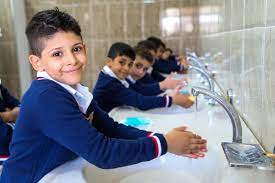F.P. Report
ISLAMABAD: Better hygiene at educational institutions is as important as education itself to create healthy minds and well-equipped nations and establish countries on sound technical, scientific, cultural and economic footing.
The schools are not only expected to impart better education to children but also better hygiene to fulfill the undeniable right of every child to get proper education in a clean and healthy environment.
Therefore, keeping in view the importance of hygiene facilities in educational institutions, the Federal Government is all-set to launch “Oral Hygiene Program” at 423 public sector schools and colleges functioning under the Federal Directorate of Education (FDE).
Under this Program, the federal government through the Ministry of Federal Education and Professional Training would distribute ‘Hygiene Kits’ among the students of the government educational institutions within Islamabad Capital Territory jurisdiction. Doctors would be engaged to guide students on the use of these kits consisting of tools for teeth cleanliness and soap and sanitizers. “Hygiene Kits distribution program will be launched in April 2023 with the distribution of as many as 100,000 kits among the students,” said Director Academics Federal Directorate of Education Riffat Jabeen. “The government will hire doctors to execute this program who will guide students about cleanliness and check their health conditions. If any student is found suffering from any disease, he or she will be referred to the hospital for a detailed check-up,” she informed.
She said facilities like dispensers for clean drinking water, liquid or soap for hand washing after the use of toilets are already being provided at each government school and college of Islamabad. “Students are also guided about cleanliness, taking bath regularly, washing hands, brushing their teeth and ablution for prayer etc.”
Riffat Jabeen said that some private organizations are also engaged with FDE to provide missing facilities at schools especially clean drinking water and Pakistan Council for Research in Water Resources (PCRWR) played an important role in this regard. Despite her claims, there are complaints of missing facilities at schools, especially for female students as poor cleanliness and substandard food supplied by canteens inside the school premises and private vendors outside, was proving to be hazardous for the students’ health.
In many cases, there is also a deficiency of bathrooms as compared to the number of students with many needing immediate repair and up-gradation as Director Monitoring FDE Malik Sohail assured to provide missing facilities. “We are on way to bridge this gap and missing facilities are being ensured for all such institutions,” Sohail said.
Principal Islamabad Model College for Boys F-6/2 Ali Ahmad Kharal has informed that Prime Minister’s Education Reforms Program worth Rs four billion was launched for betterment of ICT Schools and Colleges especially in rural areas.
Out of this amount, around Rs three billion were used for renovation and provision of missing facilities at the public sector educational institutions of Islamabad with Rs 500 million utilized to improve transportation facility by purchasing 200 new buses. The remaining Rs 500 million were reserved for new curriculum.
It is worth mentioning that Prime Minister Muhammad Nawaz Sharif in 2017 had launched Educational Reforms Program for upgrading facilities at 423 schools and colleges in the Federal Capital.
Under this Program the facilities of science and IT labs, classrooms, libraries, sports and play areas were upgraded at some 21 educational institutions during the first month while remaining were upgraded in next 10 months.
“Hygiene conditions are far better now than the past years especially at institutions where the Principal and staff are active,” Ali Ahmed Kharal said. “During last two years massive tree plantation was also carried out at the government schools and college to ensure cleaner environment.”
As the efforts are on to achieve the targets of better cleanliness and hygiene, in some cases the shortage of staff and funds is also reported.
“At some institutions there is shortage of sanitary staff and a requisition has been forwarded for induction of more sweepers and sanitary workers to overcome the shortage,” informed President Federal Government Teachers Association Malik Ameer Ahmad Khan.
He further said that under the government’s Deworming Program at ICT schools and colleges, the children are being provided tablets regularly to safeguard them from different diseases. “We are fully alive to better health of our children and the Association has formed a committee for identifying missing facilities at government schools and ensure their earliest provision,” Malik Ameer Khan said. Although the government has initiated multiple measures to promote better hygiene at educational institutions yet there are still challenges like inadequate attention to hygiene concepts in the curricula, un-conducive environment, teachers’ and parents’ carelessness toward students hygiene and communication gap among them besides poor coordination between health and education departments. Therefore, the authorities must adopt a holistic approach with the involvement of all stakeholders to promote hygiene by revising curriculum and raising awareness among teachers, parents and students on the issue besides ensuring a strong coordination between concerned departments. (APP)







